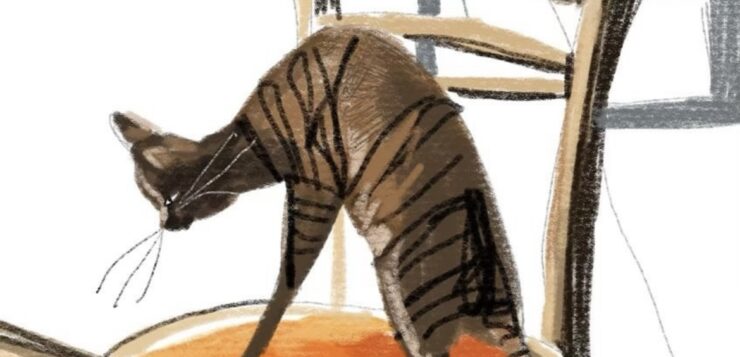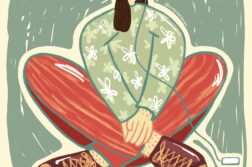TW: graphic mentions of animal cruelty.
The first time I saw footage of Annabelle, she didn’t have any fur. Her neck was so spindly that the proportions of her head appeared almost comical— like a macabre stick figure or a twisted cartoon. Her physical condition was horrifying but the emptiness in her eyes was worse.
When I saw my first photo of Cheska, half of her body was raw. That red rawness was her recovery phase— healing after someone poured a pot of boiling water on her just to see what she would do. Where Annabelle looked empty, Cheska was afire— as hot with anger as the water that left her with first-degree burns.
The day I brought Cheska home with me, she was angry with the world and everyone in it. When Annabelle arrived— after she had been through a 17-hour flight and a 4-hour train journey— she was completely silent. Not a single meow of complaint.
When I finally brought her home, encouraged her to stretch her legs and complain to me about her trip, she stared blankly as if to say, “Nothing could be worse than what I’ve already lived through.”
That’s because Annabelle and Cheska are survivors of the casual unchecked animal cruelty that characterizes daily life in Dubai. For tourists, Dubai is a glamorous holiday destination, a paradise of perfect vacation pictures. But for Annabelle, Cheska, and the millions of other cats just like them, Dubai is a living hell which few ever escape.
Beneath the picture-perfect holidays lies a culture in which animals have no rights. In fact, abject cruelty is sanctioned by the government. Why? Like many countries, Dubai has a serious overbreeding problem. When a government neglects to prioritize animal welfare education or provide funding for shelters and rescues, it’s no surprise that that country’s stray animals will experience an epidemic of overbreeding and disease.
Adequate education and funding— which Dubai has in spades— could easily alleviate this issue. But instead of pursuing this simple solution, the government has elected to take a more barbaric approach. Never mind opening shelters or spay and neuter clinics; why do that when you could simply poison every stray cat in sight? If the poison doesn’t kill them quickly enough, why not round them all up in garbage bags, drive them hundreds of miles into the middle of a desert, and leave them there to slowly die?
It could be argued that cats who are raised by breeders have it even worse. In keeping with Dubai’s status as the pinnacle of luxury, designer cat breeds are one of the country’s most popular industries. Flat-faced Persians and Siberian Forest cats— like Annabelle— are bred at an alarming rate to keep up with the demand for fluffy accessories that embody wealth.
Because purebred luxury cats in Dubai sell for anything between £3,000-£10,000, breeders have a significant incentive to keep their “products” in good condition. And yet they rarely ever do. After all, why bother taking care of luxury cats when you can breed them till they drop dead and simply kill any who appear sick or “defective?” That’s what happened to Annabelle. When 4-month-old Annabelle had the nerve to get sick, her breeders dumped her in the middle of the night in a market where it’s not uncommon for cats to be sold as meat, bait, or torture fodder.
Miraculously, Annabelle was rescued. So was Cheska. Each time, they caught the attention of women who fight on the front lines of animal cruelty in Dubai every day. They are not representatives of animal shelters nor are they backed by the efforts of rescue organizations. In fact, it’s illegal to feed stray cats in Dubai, much less rescue them. And yet they keep trying.
But, as amazing as Jo and Aileen are, they can’t save everybody. So, when I think about lost voices, all I can think about are the cats who never get happy endings. As a domestic violence survivor, I know what it’s like to be trapped in a traumatic situation, to feel unable to break free. But even though it took me a long time to speak up and ask for help, the key difference is that I had a voice. I had a way to speak up and people who would listen.
The cats of Dubai don’t have that. So, this piece is for those who can’t speak for themselves. It’s a reminder that they’re out there, that they still need our help, and that we cannot sit by and forget them.
Offering your home to a cat from overseas is the best way to make a difference. Whether you foster or adopt, giving them that safe space makes it easier for people like Jo and Aileen to save lives on the front lines. But if you can’t foster or adopt, you can donate. In Dubai, even £5 goes a long way toward life-saving medical bills. And if donations aren’t an option for you, you can use your voice.
Your voice, your presence on social media is an asset that cats like Cheska and Annabelle didn’t have. You can raise awareness, You can encourage other people to donate, foster, or adopt. Your voice has the power to save a cat’s life.




